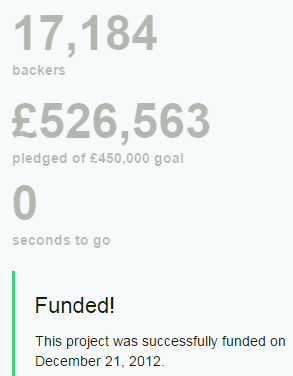All this amusement made a sharp turn recently as Godus took the spotlight. Launched to Kickstarter in 2012, Godus was meant to be a new God game in the same vein as Populous. Although not much was shown of the actual game, and given Molyneux’s well known inability to deliver on every single promise, it was successfully funded. A version with typical gross free-to-play mechanics was instituted on mobile while a PC release crawled onto Steam Early Access. There it has remained since September 2013, which is when the finished game was initially promised. Sure, crowdfunded games failing to reach their expected release date is nothing new, but there’s far more to the story.
You’ve probably already heard most of it, but basically big gaming sites suddenly took interest in Godus again. Backers had already been angry over lack of updates, failed promises, and more, but a few stories really brought this disaster to the eyes of more gamers. First there was mention in December of Molyneux taking most of the Godus team over to work on another title called The Trial. Then there were aspects like a damning forum post by backer-turned-22Cans Staff member in January: “To be brutally candid and realistic I simply can’t see us delivering all the features promised on the Kickstarter page, a lot of the multiplayer stuff is looking seriously shaky right now especially the persistent stuff like hubworld.” Articles also peppered sites such as Eurogamer which brought to the forefront the realization that the teen who had won 22Can’s Curiosity contest has been routinely ignored and not provided any compensation he was promised thus far. Basically, it was a perfect storm of media attention which has culminated in a new vitriol against the once-esteemed game creator.
But how did this all come to pass? For one, Molyneux is the master of “talking the talk” whether or not he can actually manage it – and everyone was already well aware of this. Only this time, he took 17184 backers and £526,563 along for the ride. This, it appears, is why folks can no longer simply laugh at these failed promises. The money was provided by “us” the gaming community at large. Despite the consensus about Molyneux’s continual need to promise grander and grander things, he apparently even stepped beyond his usual comfort zone as this quote in TechRadar’s interview demonstrates:
“There’s this overwhelming urge to over-promise because it’s such a harsh rule: if you’re one penny short of your target then you don’t get it. And of course in this instance, the behaviour is incredibly destructive, which is ‘Christ, we’ve only got 10 days to go and we’ve got to make £100,000, for f**k’s sake, lets just say anything’. So I’m not sure I would do that again.”
This quote should be immensely troubling for everyone in the gaming community, but especially those who have faith in crowdfunding. It also should not surprise those of us who have backed a few projects over the years. Whether you crowdfund on Kickstarter, Indiegogo, or something else you rarely have a final product presented on the page. Instead, they tend to be promises – and sometimes there’s a prototype mixed in too. But really, what backers must do is take in the concepts presented by someone else and trust that they’ll make good on them. If there’s no fundamental trust then people won’t back. There is never 100% certainty that a crowdfunded project will ever come to fruition, but accountability still exists. Fail to complete what you’ve promised and backers (and now apparently a far larger gaming sphere) will respond.
As someone who did not back Godus, I do believe that Molyneux and 22Cans as a whole must do something to compensate their backers. The hope is they will finally make good on their promises, even if it takes another year, and all this attention is likely going to be a direct contributor to that cause. However, most commentators appear to be ignoring one key element of this entire story. This is not just a Molyneux-specific problem. This is a problem which lurks within crowdfunding itself. The message sites should be presenting is that this is just one spectacular example of campaign promises imploding and that we should all learn from it. Instead, many appear to simply be turning against Molyneux because it’s easy to do when the person involved has “celebrity” status.
Godus is not the only campaign that has promised far more than it may ever be able to deliver. Godus is not alone in making extravagant claims in hopes of getting their Kickstarter funded in its final days. Molyneux is not the only person who has failed to fulfill his duties to a large backer population. He will also not be the last. Every month we see new crowdfunding campaigns go live which are incredible passion projects from the developers involved. Having never created a full game myself I cannot even begin to imagine what it feels like to see your dream game not achieve the successful funding you expect it to. So what happens then? Do you pack it up and leave? No, you double down on promises of further upgrades, tweaks, and things that you believe (or have heard) gamers desire. Some developers have the ability to fund their games without bending to public opinion, but others attempt to attract attention by any means necessary.
It is incredibly easy to pick on Molyneux. He is a long-established name in the industry who has made gamers groan for years with outrageous, implausible promises. But simply interviewing him in more aggressive forms, as RockPaperShotgun did quite effectively, does not solve the problem. Perhaps it’ll make him actually retreat from press (as he has suggested in multiple interviews, oddly enough). If that actually does come to pass there will be no celebration. His voice will simply disappear from the public sphere for a while and everyone aside from actual Godus backers shall get on with their lives. Instead of learning any lessons from this entire debacle, most probably won’t change their backing habits. After all, these campaigns are run by indie studios and not Molyneux!
It doesn’t matter, though. The problem of making grand claims over what you want to create or actually can is a pervasive issue within the crowdfunding sphere. Most developers on Kickstarter have not attained name recognition status, but that makes their ability to succeed all the more challenging. Luckily, most project leads only promise and promote aspects and features they can actually make good on. Most ensure they’re not simply full of hot air. In the case that they cannot provide a promised aspect they also alert backers to the developments with an explanation and possible alternative. Molyneux failed in these regards, but so too can anyone else.
Backers, do your due diligence before backing by looking for demos, prototypes, or other bits of “proof” that a developer can provide before funding a campaign. Sometimes this just doesn’t exist, but believe me when I say it will become a more common feature of campaigns in the future. At this point in time it simply is more challenging to fund one now that consumers have seen multiple spectacular Kickstarter failures. Godus, although not total flaming wreckage just yet, certainly has had all positivity knocked out of it. It’s impossible to know if you’re backing “the next Godus” but recognise this – most crowdfunding campaigns are a success. They may take longer to launch than expected, or offer something a bit different than initially expected, but most will make it into the player’s hands.
Gaming press have their own lesson to learn, as well. Do not go wild publicizing Kickstarter campaigns simply because they have a big name behind them. Does previous success equate to future success? No. It is especially problematic for huge sites to cover campaigns with almost no information because their concepts are super cool (or, again, designed by esteemed creators). We at Cliqist cover a variety of campaigns in various states, but that’s because we are a site entirely about crowdfunding. Even so, if a campaign features a huge lack of actual information we do our best to point that out. Games media needs to be more accountable for what they promote. Whenever possible, they should strive to showcase campaigns which offer “evidence” for at least a few of their claims. Sure, campaigns fueled purely on promises can succeed as well, but the chance of drama evolving throughout development is higher. Whatever the case, Cliqist hopes huge Kickstarter meltdowns remain a rarity.








[…] decided that Godus was clearly going nowhere, so I thought, ‘screw it!’, and cancelled the project […]